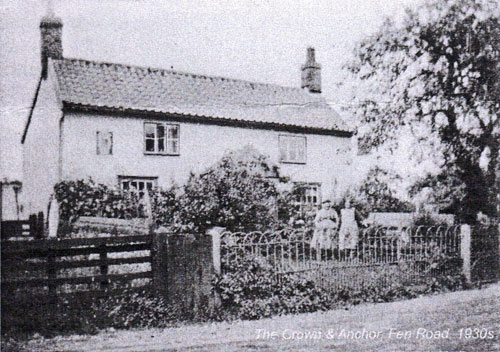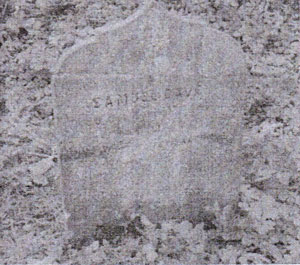Mid Summer (Road) Murder – 100 Years Ago
Murder in Walsham le Willows!
Most of the time Walsham is a quiet and peaceful village but in the past it was not always so. One hundred years ago on a summer’s day in July 1911 it was the scene of a violent fight which ended up with one man dead, seven with bullet wounds, and two men and a woman charged with murder.
The Bury Free Press reported the serious affray on the village sports meadow:
‘Following the close of the annual Foresters’ Gala there took place disgraceful scenes such as never witnessed in Walsham. A little after 11 o’clock it appears there was some dispute between those associated with the flying horses of Dack’s Steam Circus and some of the public about payments and the change given. High words were followed by a general melee. Attempts made to wreck the flying horses and sideshows were met by wooden poles, iron bars, and ultimately the rifles used for target shooting. Bullets were flying about with the freedom of a miniature battlefield, many persons being hit who had nothing to do with the quarrel.’
In the terrible fighting several village people were injured. James Clarke was shot below the heart. Later a motor car was procured to take him to Bury Hospital. Arthur Nice, a postman, was shot in the back and the collarbone. His son Harry was knocked down with a pole and when he got up received a shot wound in his head. He was carried home on a hurdle and later transferred to hospital where his condition was described as hopeless. (However Harry (Cucky) Nice did recover, living until 1955. He had fought in the Boer War and older residents remember that he kept a bundle of Zulu spears (assegais) in his cottage behind The Six Bells (now No.1 Summer Road). His mother had come to his assistance at the gala but was herself knocked unconscious with a rifle butt.
Some said they had seen a woman and a black man firing shots but much of the evidence was vague and conflicting. One witness was asked how he could remember everything the showmen did and yet nothing the Walsham men did.
The judge commented:
‘the Walsham men should not think they were heroes, some might think they got what they deserved.’
The accused were then taken to Thurston Station and then to Ipswich jail to await trial by jury at the Suffolk Assizes in Bury St Edmunds.
The trial in October 1911 lasted two days and many witnesses were called.
Horace Ball, a friend of the deceased, explained that on hearing the disturbances they went upwards towards the row, going either side of the flying horses. When they met up Davey said he had been shot. (Contradicting an earlier report which said he was passing the sports meadow in a horse and trap when shot). When questioned, the witness denied they were drunk saying that they only had six or seven glasses at the drinking booth. The defence lawyers made great play over the sobriety of the crowd. James Dew was called to the witness box. ‘Were you drunk?’ he was asked. ‘No, I only had one ot two,’ ‘One or two what? dozens? gallons?’ (Laughter in court) ‘I was not drunk.’ ‘There are a good many rows in Walsham aren’t there? Were you the leader of the crowd who at the last election chased a man out of the village and tried to kill him? ‘No’ ‘You have been convicted of assaulting a policeman and convicted of night poaching.’ ‘That’s nothing to do with this.’
James (known as Brahma) Hubbard took the stand. ‘I had been drinking on and off all day but was not drunk.’ ‘I suppose you don’t consider yourself drunk if you can stand up.’ (Laughter in court) John Dew entered the witness box and was cross examined. ‘I put it to you that you are the most desperate man in Walsham.’ ‘No’ ‘You were convicted for game trespass and poaching and were involved in the election row. At the gala you attacked Gray, and with your friends kicked him.’ ‘That’s a lie. I was not involved.’ ‘So your story is that you did nothing.’ (More laughter in court)
The doctor and the police gave evidence that the Walsham men were much the worse for drink. A policeman was asked ‘Pretty well known men are they not?’ ‘Yes.’ ‘Known as roughs, are they not?’ ‘Yes, they are a class to be known.’ The defence lawyers claimed that their clients were attacked by a large overwhelming crowd and were only protecting themselves. It was difficult to say if one of the accused fired the shot that killed Davey.
Samuel Minto, described as ‘a man of colour’ said that he had not shot anyone. He was hiding for two hours because the crowd had chased him. John Dew, known as ‘the scourge of Walsham-le-Willows’ had knocked down Robert Gray and some of his women. Gray said he was in fear of his life and only fired over the heads of the crowd. Lavinia Wheatley said that she never had a rifle.
Also hit was Police Constable Double from Rickinghall, who was assisting Walsham’s Sgt. Ransome. He was shot through the thigh, the bullet passing close to the artery. Also shot was a man named James Hubbard, with a rifle bullet lodging in the muscle of his back, and another man, James Dew, who was shot through the leg. It was also reported that on his way home in a pony and trap Mr. Sam Davey, who kept the Crown & Anchor pub in Blo’Norton, was hit by a stray bullet. He had gone on home and was not thought to be badly injured.
Walsham’s doctors Mr. Malcom Poignand and his son, Ralph Poignand worked well into the early hours of the next day attending to the injured. A man was dispatched to Hichcock’s Motor works in Elmswell for cars to take the injured to the hospital in Bury St Edmunds. The next morning 60 cartridges were picked up.

Arrests were made. Robert John Gray, aged 36 a travelling showman from Lowestoft, Lavinia Wheatley, aged 40 a traveller from King’s Lynn, and Samuel Minto, a Jamaican boxer engaged by the fair to ‘fight all comers’ were charged with malicious wounding and causing grievous bodily harm. However one of the injured men died. The new charge was MURDER.
The Bury Free Press reported that publican Samuel Davey had died at Norwich Hospital. He was born and had lived in Walsham most of his life until moving to Blo’Norton.
At the court appearance at Ixworth his wife spoke, often breaking down in tears…
‘I have identified the body to be that of my husband, Samuel Davey who was 37 years of age and landlord of the Crown & Anchor. He had left home on Monday afternoon to go to Walsham Gala and did not return until 3 am. on Tuesday. He said that he had been shot in the body but did not say how. In the morning he saw his local doctor who sent him to Norwich Hospital on the train. On Thursday he died of internal injuries.’
This session in court was lengthy and was often adjourned. Many witnesses took the stand and statements were reported in great detail in the local press.
Summing up, the judge said…
‘That there was a rough crowd is not in question. A considerable amount of drink had been consumed. However, to say that the showmen only fired over the heads of the crowd is to say that members of the crowd shot each other, which is absurd. The provocation however was very great and there is a right to protect oneself.’
Minto and Wheatley were discharged due to lack of evidence and Robert Gray was sentenced to ten months hard labour for unlawful killing.
In November 1911 it was reported in the Bury Post that after the death of her husband Samuel Davey at Walsham-le-Willows, Louisa Rose Davey of Blo’Norton was now destitute. Her husband owed £33 and £14 to the brewers and she had to sell everything to pay off the debts. The brewers, Greene King, ‘had kindly remitted £10 of the rent due. She had six children all under 12 and was now receiving 10s. 6d. a week relief. It was asked that to help the poor woman subscriptions should be sent to the rector of Blo’Norton; “Widow Davey Fund”.

Prior to moving to Blo’Norton the census of 1901 shows Samuel living as a general labourer in Palmer Street with his wife Louise, who was born in Streatham, and a one year old daughter named Muriel.
Alone in a corner of Blo’Norton churchyard a small gravestone marks the place where Samuel Davey is buried. His epitaph, taken from the Prayer Book, reads:
‘In the midst of life we are in death.’
John Champion & James Turner
With thanks to
- Mr & Mrs Davey
- Jo Reynolds
- John Dixon
References
- S.R.O. Bury Free Press archive

